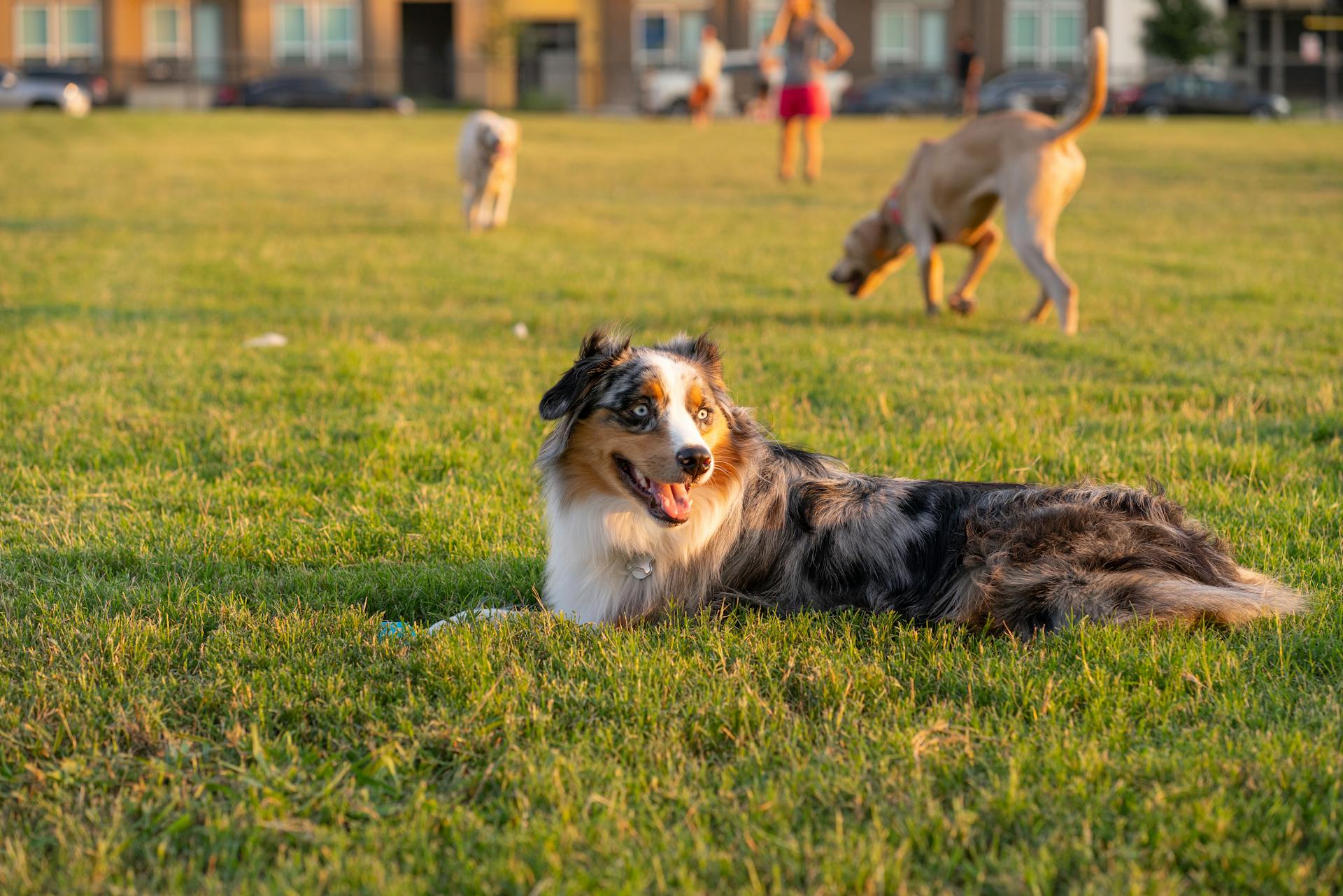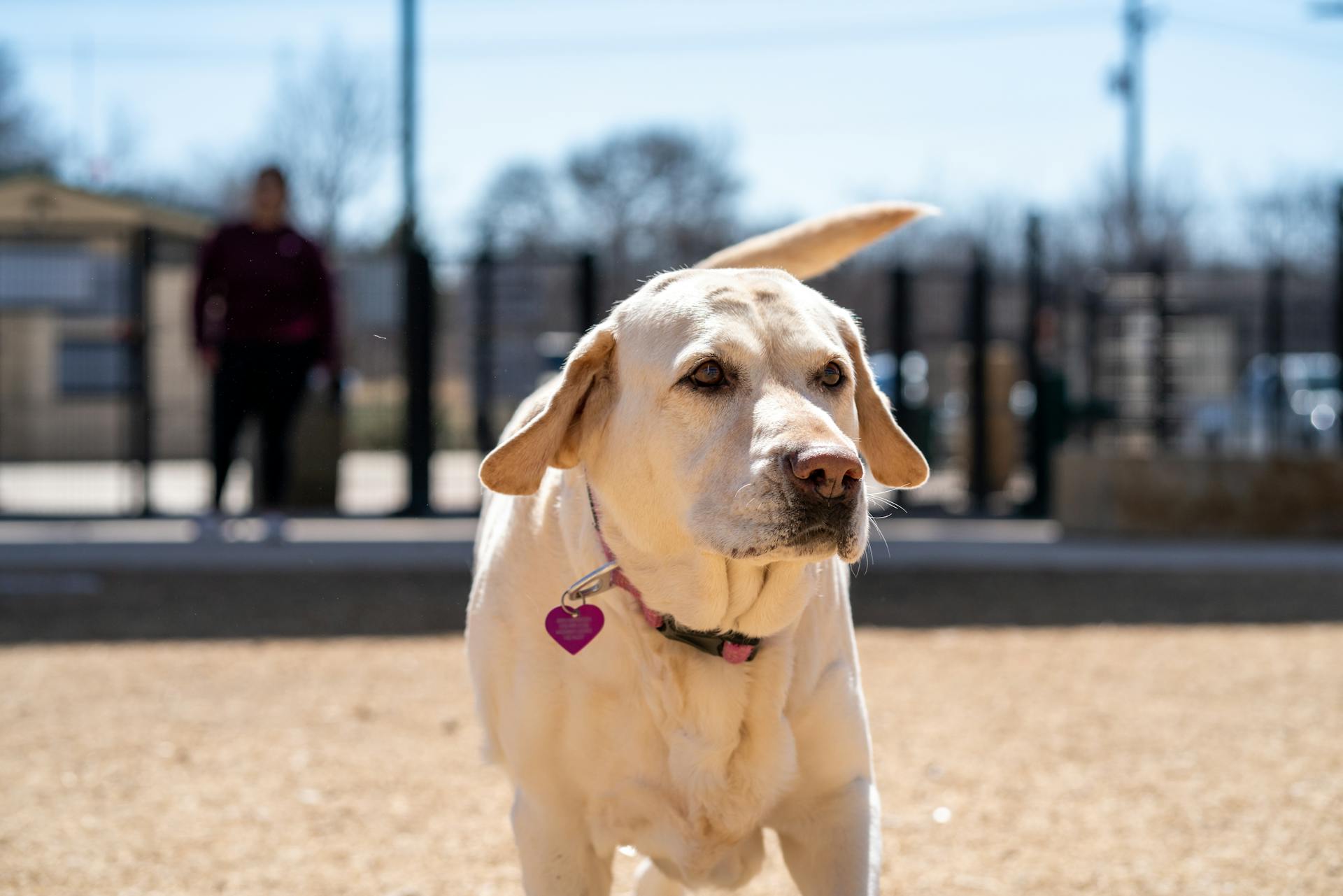
Dogs are highly social animals that thrive on interaction with their human family and other dogs. They have a unique ability to read body language and respond accordingly.
Their social behavior is deeply rooted in their evolution as pack animals, where they relied on each other for survival. This pack mentality is still evident in their behavior today.
Dogs are known to form close bonds with their owners, often becoming deeply attached to them. In fact, research has shown that dogs can recognize their owners' faces and respond to their emotions.
For more insights, see: Dog anti Social Behaviour
Dogs' Emotional Intelligence
Dogs have emotional processing regions in their brains that respond to human emotional sounds, like laughing and crying, in the same way as they respond to dog emotional sounds.
Their brains are wired to understand and respond to emotions, making them highly attuned to their owners' feelings.
A study found that dogs showed stress in response to their owners' crying noises and attempted to comfort or help a crying owner.
A unique perspective: How to Get Dogs Registered as Emotional Support Animals
Dogs are more likely to attempt to comfort a crying owner compared to a laughing owner, showing that they can distinguish between different emotions.
Their ability to comfort others is not limited to their owners, as follow-up research suggests that dogs may attempt to comfort upset strangers as well.
It's interesting that dogs respond to emotions across species, and it's possible that crying is similar enough among species to elicit a response.
Dogs have co-evolved with humans for so long, which may make them particularly good at interpreting human emotion.
However, their emotional intelligence doesn't mean they feel guilt or shame, as is often assumed.
A study found that the "guilty look" dogs give when they sense trouble is simply a way to stay out of trouble, not a sign of actual guilt.
Dogs have learned to make this expression to avoid punishment, not because they understand the concept of guilt.
How Smart?
Dogs are pretty smart, but their intelligence is mostly focused on social interactions and hunting skills. They have sensory abilities similar to those of other hunting carnivores, which helps them navigate their environment.
Curious to learn more? Check out: Hunting Dog Food Brands
Dogs are great at paying attention to cues from other dogs and from humans, their evolutionary co-pilots. They're socially savvy and can even use other animals' behavior to cue their own.
Dogs are impressive at social learning, beating out many other similar animals at using other animals' behavior to cue their own. However, they don't show many signs of self-awareness, which means they don't have the ability to project themselves mentally into the past or future.
Dogs are domesticated social carnivores and hunters, so their intelligence is geared towards their natural abilities, not necessarily towards problem-solving or complex planning.
Additional reading: Social Security Disability Service Animal Assistance Programs
How Can I Help?
If you're wondering how you can help your dog be more social, start by understanding their pack mentality - dogs are highly social animals that thrive on interaction and companionship.
Dogs are naturally inclined to follow a hierarchical structure, with a dominant leader and a submissive follower, so try establishing a clear hierarchy in your household.
Curious to learn more? Check out: Social Anxiety Dog Training
By spending quality time with your dog, such as going for walks or playing fetch, you can strengthen your bond and help them feel more confident around other dogs and people.
Dogs are highly attuned to body language, so be mindful of your nonverbal cues when interacting with your dog - a gentle touch and soothing voice can go a long way in making them feel more at ease.
If you're struggling to get your dog to interact with others, try enrolling them in a socialization class - these classes can provide a safe and controlled environment for your dog to meet new people and dogs.
In fact, research has shown that dogs that participate in socialization classes are less likely to develop anxiety and fear-based behaviors around other dogs and people.
A fresh viewpoint: Dog Training Socialization
Dogs as Social Beings
Dogs are wired to understand us and are attracted to human faces from an early age. They tend to be submissive towards humans and follow our directions, whereas wolves are bolder and more likely to lead.
Dogs learn to follow our gaze and show a left-gaze bias when looking at human faces, which suggests they're reading our faces to figure out how we're feeling. This bias emerges in several species when processing emotional information.
Social interaction triggers the release of oxytocin, a hormone associated with feelings of bonding and affection. This is why dogs experience a surge of feel-good hormones when they're in the presence of other dogs.
Dogs are highly attuned to social cues and use body language, vocalizations, and scents to communicate with each other. They have a strong sense of hierarchy, with dominant dogs taking charge and submissive dogs following their lead.
- Dogs need positive social interactions with their caretakers as well as other dogs.
- Dogs are social animals and thrive on interaction with both humans and other dogs.
- Socialization is a critical component of a dog's development and is important for their mental and emotional well-being.
A well-socialized dog is less likely to react negatively towards other dogs and people, and is more confident in social situations. They're also more likely to be healthy and have a positive mental state.
Dogs may have different social preferences depending on their breed, so it's essential to study and understand your dog's breed, including their typical temperament and social needs.
Dogs' Temperament and Behavior
Some dogs are natural social butterflies, thriving in the company of other dogs and people. If your dog is one of them, introducing a new furry friend can be a great idea.
Dogs with outgoing temperaments often enjoy playing with other dogs and can benefit from having a companion. On the other hand, reserved or timid dogs may prefer to be the only pet in your home.
Dogs with aggression issues may also be best suited as solo pets, as their behavior can be difficult to manage around other animals.
Temperament
Dogs with outgoing personalities often thrive with a companion, as they love playing with other dogs. If your dog is social and enjoys the company of other dogs, introducing a new furry friend can be a great idea.
On the other hand, dogs with more reserved or timid nature might prefer to be the only pet in the home. This is especially true if they have aggression issues.
Some dogs are naturally more energetic and require a lot of exercise, while others are content with shorter play sessions. If your dog falls into the former category, you may need to consider getting a companion that can keep up with their energy level.
Dogs with aggression issues may not be suitable for homes with multiple pets, as they may feel territorial or defensive. It's essential to consider your dog's temperament before introducing a new pet to the family.
Age and Energy
As you consider introducing a new furry friend to your household, it's essential to think about the age and energy level of your existing dogs. Younger dogs with high energy levels may benefit from having another dog to play and run around with.
Senior dogs, on the other hand, might favor a less active way of life and lack the stamina to match a younger dog's energy level. This can lead to frustration and exhaustion for both dogs if they're not paired carefully.
Benefits
Socializing your dog is essential for its growth and development. A dog's socialization affects its sociability, and where it lands on the spectrum.
Taking your dog to the park may seem like a small deed, but it plays a major role in determining your dog's personality.
Positive caretaker interactions are crucial for your dog's well-being. Dogs need positive social interactions with their caretakers as well as other dogs.
Freedom
Freedom is a beautiful thing, especially for dogs. Socializing your dog when they're young is crucial, as it allows them to feel at ease in new environments.
You can't bring your dog to parks or leave them at dog daycares if they're not socialized. Exposing your pup to new experiences teaches them that just because they're in a new place, it doesn't mean they're in danger.
Having friends or family over can be difficult if your dog isn't good with interactions. A dog that's not socialized severely limits the places you can bring your dog to.
Understanding and Assessing Dogs
Dogs are wired to understand us, thanks to thousands of years of selective breeding. This has led to domestic dogs being born with an interest in humans.
From an early age, puppies are attracted to human faces. They tend to be submissive towards humans and follow our directions.
Dogs also learn to follow our gaze, and show a left-gaze bias when looking at human faces. This means they spend more time looking at the left side of our faces, which is a sign that they're reading our emotions.
Dogs can even follow our pointing gestures, although it's not unique to them - many domestic species and some wild animals can do it too.
For more insights, see: Straw Dogs Thoughts on Humans and Other Animals
Frequently Asked Questions
Why is my dog so friendly with strangers?
Your dog's friendly nature around strangers may be due to her perceiving kindness and love from everyone she meets, just like from you. Training her to be calm around strangers can be achieved by inviting trusted friends to interact with her.
Sources
- https://www.livescience.com/facts-about-dogs
- https://theconversation.com/an-experts-top-5-reasons-why-dogs-can-be-considered-exceptional-animals-211832
- https://www.petbacker.com/blog/facts/are-dogs-social-animals
- https://www.dogster.com/lifestyle/are-dogs-social-animals
- https://caninewelfare.centers.purdue.edu/behavior/social-interactions/
Featured Images: pexels.com


